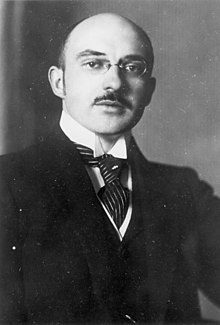Scheubner-Richter
| Max Erwin von Scheubner-Richter | |
|---|---|
|
Max Erwin von Scheubner-Richter
|
Ludwig Maximilian Erwin von Scheubner-Richter or Max Scheubner-Richter, born Ludwig Maximilian Erwin Richter (21 January 1884 – 9 November 1923) was an early member of the Nazi Party. Along with Alfred Rosenberg, he devised the plan to drive the German government to revolution through the Beer Hall Putsch. During the Putsch, he was shot in the lungs and died instantly, at the same time dislocating Hitler's right shoulder.
Scheubner-Richter was a Baltic German born in Riga, Livonia and lived a large part of his life in the Russian Empire. During the Russian Revolution of 1905 he belonged to one of the private armies set up to fight against the revolutionaries. He married the daughter of a manufacturer whose factory he had guarded. The 'Scheubner' in his surname was prefixed to his own from his wife's family name: an old German form of having one's lineage ennobled.
During the First World War, Scheubner-Richter served in Ottoman Turkey as the German vice consul of Erzerum. In addition to holding that post, he also documented the Turkish massacres of Armenians as part of the Armenian Genocide. At the time, he was considered one of the most outspoken individuals against the deportations and subsequent massacres of Armenians. Scheubner-Richter believed that the deportations were based on "racial hatred" and that none could survive such a journey. He concluded that the deportations were a policy of "annihilation".
After the war he was involved in the Russian counter-revolution.
Scheubner-Richter moved to Germany from Russia along with Alfred Rosenberg in 1918. He was the leader of the Aufbau Vereinigung, a conspiratorial organisation, composed of White Russian émigrés and völkisch-minded German National Socialists.
...
Wikipedia

